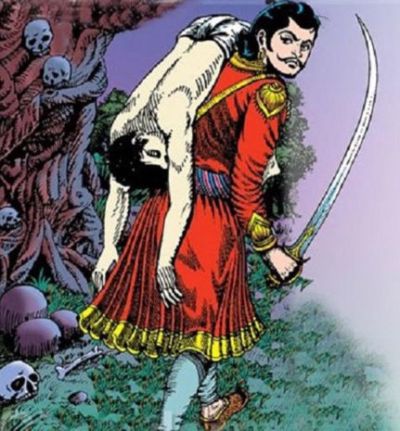Read the previous part here…
“Oh great king, you have spoken the truth. One who possesses virtue, possesses everything. It is only virtue that stays with us – riches, power, prestige, all come and go. My king, each of these gems is invaluable, priceless pieces that have no equal. Each ruby is worth a kingdom, and more. There is no one who can put a price on any of them, and there is no one who can pay a price, or even a tenth, for any of them”, replied the jeweler.

The king, having heard what the jeweler had to say, thanked him, turned to the yogi and said “My entire kingdom is not as valuable as just one of these rubies. Tell me why you, who has renounced the world, chose to give me such riches.”
ShāntiShila replied “O King! Talks on mantras, Ayurveda and aushadhiy (medicinal herbs), good qualities, matters of the household, and scandals – are not to be spoken aloud and in public. I am willing to speak to you in private. षट्-कर्णो भिद्यते मन्त्रश् चतुष्कर्णः स्थिरो भवेत् तस्मात् सर्व-प्रयत्नेन षट्कर्णं वर्जयेत् सुधीः ॥ A secret that is heard by six ears will most certainly be leaked; a discussion that is limited to four ears will always be kept secret. And if it is limited to two ears, then even Brahma cannot come to know of it. Therefore the wise should always avoid a discussion that is heard by six ears.”
Hearing him speak this way, King Vikram took ShāntiShila to his private chambers, sat him down, and said “O holy saint! You have brought me so many riches, yet have not even accepted a grain of rice from me. I am indebted to you. Tell me what you desire from me, and I will make sure that it is done.”
ShāntiShila replied “O mighty king! I am going to conduct a ritual on the banks of the river Godāvarī, in a large cremation ground. This ritual is intense, and will result in me having control over all the eight Siddhis. All I ask from you is to stay with me during the process. If you are with me, my ritual will be successful.
There are eight types of siddhi (attainment) defined:
- adhyayana (study),
- śabda (oral instruction),
- ūha (proper reasoning),
- suhṛtprāpti (discussions with gurus and fellow learners),
- dānā (purity),
- ādhyātmika-duḥkhabighāta (cessation of sorrow caused one’s ownself),
- ādhibhautika-duḥkhabighāta (cessation of sorrow caused by human and sub-human beings),
- ādhidaivika-duḥkhabighāta (cessation of sorrow caused by super-human beings).
King Vikram replied “I humbly accept your invitation. When should I come there?”
ShāntiShila said “On the night of Bhānuvasarah (Tuesday), the fourteenth night of the Krishna Paksha of Bhādrapada, you are to come to me, armed, but alone.”
King Vikram replied “You have my word. I will be there.”
ShāntiShila bowed to the king, and left. King Vikram sat down, deep in thought.
It was the fourteenth night of the Krishna Paksha of Bhādrapada, and King Vikram reached the cremation ground. ShāntiShila was there, sitting alone with a small fire burning in front of him.
“Come, sit down, o king”, he said, without turning his head.
The king looked around. there were frightful figures, apparitions, surrounding the yogi, dancing in wild abandon. ShāntiShila was seated in their midst, two skulls in hand, chanting mantras as he moved the skulls in a slow circle. Vikram was not frightened, nor alarmed, since he had expected this. He sat down a few feet away, and said “Tell me, o yogi, what can I do for you?”
The yogi replied “I just have one task for you, o mighty king. But one, that only you can execute. A few hundred yards to our south, is a place where the dead bodies are cremated. In the middle of that ground is a banyan tree, on which a corpse hangs upside-down. Bring that corpse to me…”
to be continued…
